A corner of Corsica that is forever Finnish
It’s 25 years since rallying star Henri Toivonen and co-driver Sergio Cresto perished at an innocuous-looking turn on the Mediterranean isle. Today, fans and competitors still stop to pay their respects
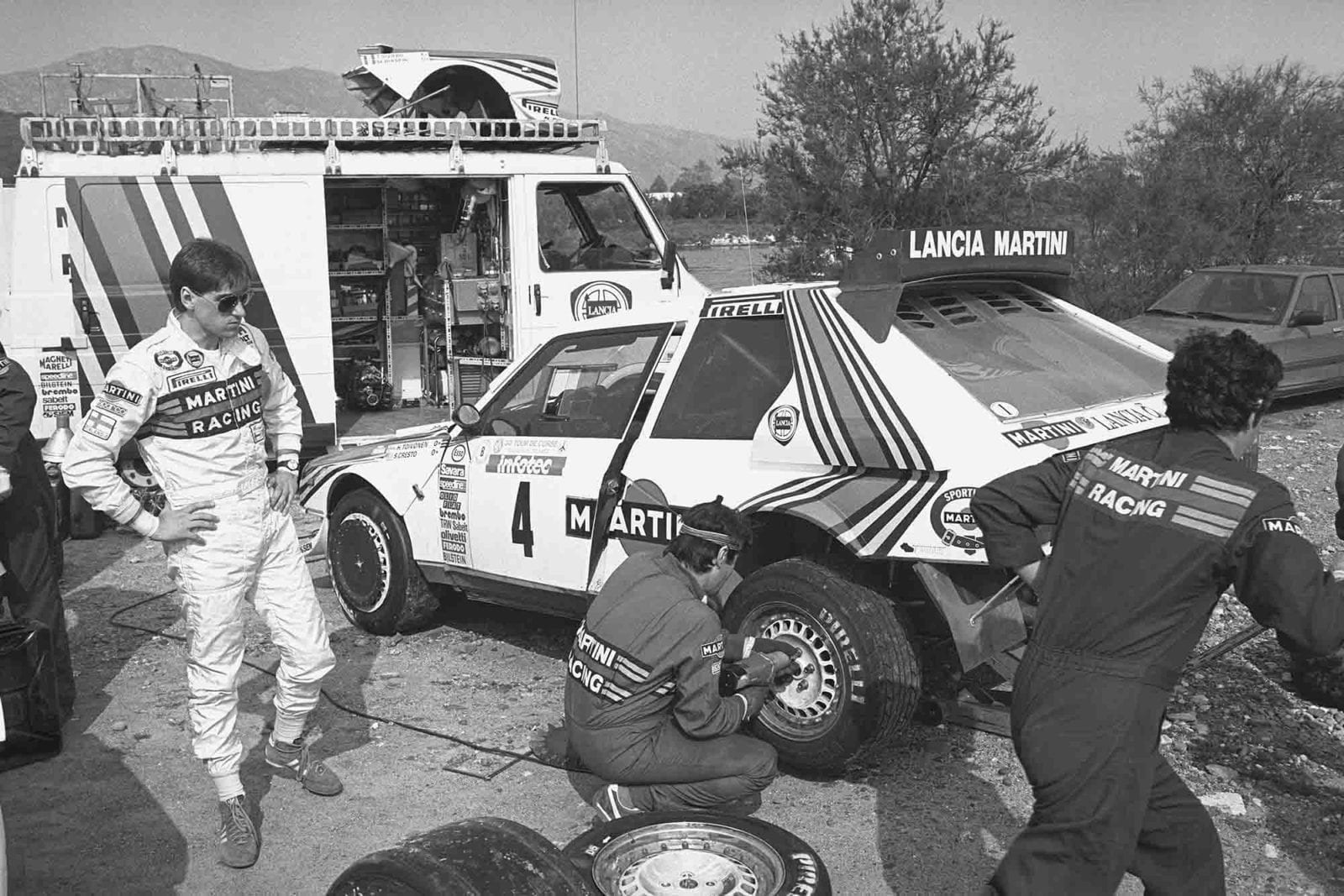
Toivonen watches his mechanics setting up the Lancia Delta during the 1986 Rally Corsica
Motorsport Images
The cheerful yellow townhouses that pack the centre of Corte – or Corti as it’s known in local dialect, often the only language visible given the propensity of patriotic Corsicans to paint out the names in French on the road signs – seem to take on a more sombre hue these days, as if somehow marked by the events that took place just a few kilometres down the road from them.
On May 2 1986, just over 25 years ago, Henri Toivonen, his co-driver Sergio Cresto and Group B rally cars died in a spot that holds a strange beauty: an innocuous left-hand corner just before a wooded valley, whose peace these days – interrupted only by the occasional distant church bell from the neighbouring village – is in stark contrast to the fiery violence of the accident that claimed the two young men’s lives at the height of their powers.
The corner is very different now, of course. Twenty-five years ago the asphalt was rough and rutted, a surface not dissimilar to a farm track compared to the proper road that it is now. In the 1980s there wasn’t much traffic between Corte and the tiny settlement of Castirla on the D18, and that’s still the case now, with the majority of sporadic passing vehicles being beaten-up 4x4s and vans, servicing the local goat farms that form some of the biggest business in inland northern Corsica and produce the island’s famous Brocciu cheese, often eaten as a dessert drizzled with local honey. Bees, goats and boars are about the only creatures that can be successfully exploited in the remote hillsides of the area, but Corsica’s untrammelled isolation is exactly what has made it an icon of rallying over the years.
“I still don’t know what happened to this day; I think it will always be a mystery…”
The event was always nicknamed ‘The Rally of 10,000 corners’ but somebody once bothered to count them and in its heyday the true figure was much closer to 20,000. Many of those corners were over sheer drops that plummeted vertiginously down towards the Mediterranean. The quietly shocking thing about this left-hander, just seven kilometres out of Corte, is that there’s nothing special about it. At first glance, you would say that it was one of the easier ones. Markku Alén, who was Toivonen’s Lancia team-mate at the time and arrived at the crash scene two minutes after his compatriot went off, confirms the initial impression: “The corner was nothing special; really nothing. There were hundreds of corners like that one and hundreds that were much worse. I still don’t know what happened to this day: was he too fast, was it something technical, was it something else? I think it will always be a mystery…”
The actual profile of the corner has changed a lot, though: these days it’s a mild sweep to the left, with a modern low stone wall describing the arc of the road on the outside and an incongruously banal metal sign informing people that it’s forbidden to dump rubbish in the lay-by just before it. Hop behind the new stone wall and you’ll see the profile of the road as it used to be: a much sharper and narrower corner that is almost 90 degrees, with a gradual drop to the valley bellow. Scuff the overgrown wasteland with your foot and occasionally you’ll see patches of the old asphalt, speckled black and grey from where it was patched up over the years before much-needed funding arrived at some point in the mid-90s to re-make the road completely.
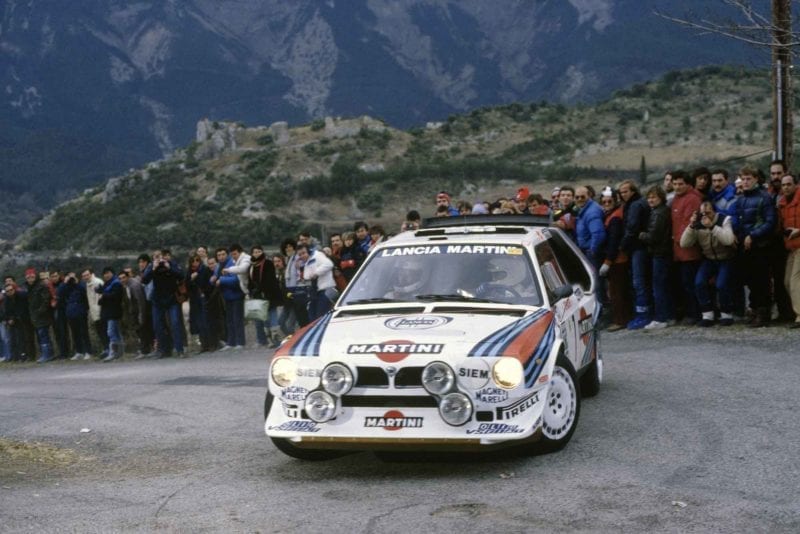
Toivonen on his usual full attack at the 1986 Monte Carlo Rally
Motorsport Images
Look down into the valley now and there’s not much to see there either. The drop is not particularly steep but at the bottom the area is heavily wooded with a few patches of unsightly litter on the way down (despite the sign). The atmosphere is one of bucolic calm and there’s no sign these days of the scorched earth that for years afterwards apparently marked the place where the Lancia Delta S4 burned down to its spaceframe. There is a patch of trees in the middle that seem to look younger and greener than their neighbours, but it’s hard to know to what extent your imagination is playing tricks on you. It was 25 years ago, after all. Many of the drivers currently at the top of the World Rally Championship hadn’t even been born.
Take a short walk 10 metres or so down the road and you realise just how much time has passed. On the left past the corner, almost hidden underneath a rocky outcrop, is a stone memorial. It’s as faded now as Lancia’s glory: a lasting reminder of that ferocious Group B era when mortality was as much a part of rallying as Martini.
The memorial, the size and shape of a conventional gravestone, is crumbling to the extent that you can fit four fingers between the slabs of granite that form the front and the back; in the middle is something that probably used to be concrete but now feels more like chalk. In the hollow, visitors have crammed small gifts and tributes, a bit like they do at Jim Morrison’s grave at the Père Lachaise cemetery in Paris. The analogy is not a random one because Toivonen brought a rock star mentality to rallying, with his endearingly gung-ho attitude hidden behind oversized aviator sunglasses and an unruly mop of hair. Like Morrison, Kurt Cobain and countless others who pushed the envelope of life and creativity, Toivonen too was struck down in his prime: three months before his 30th birthday.
The first thing that your fingers come into contact with in the crack behind the stone is cloth: an old Ford World Rally Team T-shirt, which appropriately enough bears similar Martini logos to the blue and white Delta S4 – registered TO 73074E – in which Toivonen and Cresto died.
Wedged behind the stone is a rally cap from the Tour de Corse a few years ago, and there are scraps of paper jammed into the smaller cracks, carrying tributes and messages like votive offerings. We’ve no idea what they say as it feels wrong to open them and intrude upon private thoughts. It was cool for motor sport heroes to smoke back then, so somebody has left Henri an ancient packet of red Marlboros: the choice of champions throughout the 1970s and ’80s. At the bottom of the memorial there are souvenir stickers from rallies all over the world, but what strikes you is not their number – they have quite a short shelf life on an exposed Corsican hillside after all – but their eclecticism. A sticker from Rally Finland last year, one of the most famous events in the sport, sits right next to a more recent sticker from a small one-day club rally in Italy. It gives an indication of Toivonen’s universal appeal: a bit like that which Ayrton Senna achieved in Formula 1.
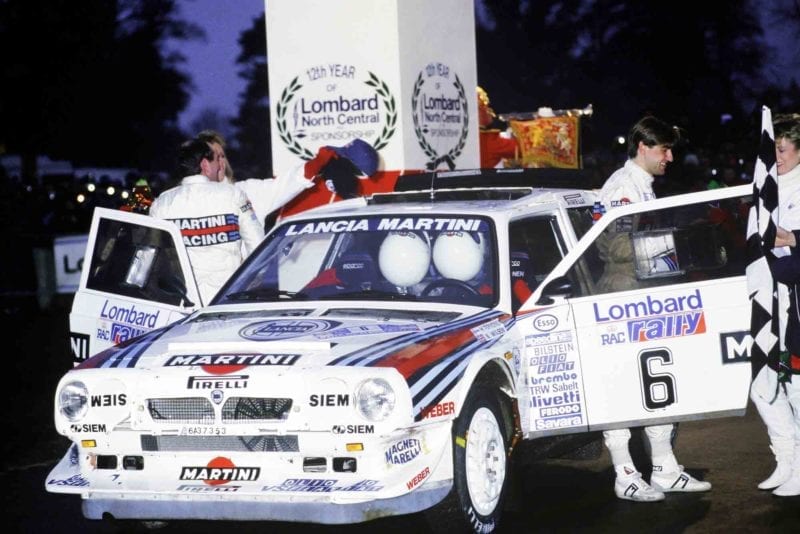
Toivonen wins 1985 Rally GB
Motorsport Images
Henri’s younger brother, Harri, knows why. “He was a small man in size but such a big man, if you see what I mean,” he says. “Henri always had time for everybody, he was the complete opposite of a snob. What people maybe don’t know about him is what a loving brother he was. I’m four years younger and he was always looking out for his little brother, as he had done all his life. I know that it’s been 25 years, but the strange thing for me is that it really doesn’t feel like 25 years have passed. He was my brother and my best friend and I think about him probably every day.”
The design of the memorial is as touching and simple as Harri’s words, with two helmets engraved on the stone, their owners’ names, and the fateful date of May 2 1986. There is still a framed photograph but the sunlight has blanched it to blank celluloid, as nebulous as the circumstances surrounding the accident.
Sitting on top of the stone is the most poignant tribute of all: a tattered Finnish flag, blue tendrils flapping in the wind, a defiant reminder that there is a corner of Corsica that will be forever Jyväskylä, the hometown of the Toivonen family and also Rally Finland.
“Henri was on a mission in Corsica”
“Everyone loved Henri because he had such a straightforward personality; I think it all goes back to our mother and father and our life at home,” says Harri, who returned to the wheel of a rally car after 23 years to drive the course car in Italy’s Tuscan Rewind rally in May, held to commemorate Henri, Sergio and Attilio Bettega (who also died in an accident in Corsica the year before Henri’s crash). “We had a very happy childhood and our parents made us the people that we are. In all our life together me and Henri only ever had one big fight, which is remarkable.”
Henri’s father, of course, was Pauli Toivonen: reluctant winner of the controversial 1966 Monte Carlo Rally (when the dominant Minis were disqualified for a trumped-up headlamp infringement) as well as the 1968 European Rally Championship, to which he added many other successes in racing and rally cars. Such was the family’s mutual trust that Henri asked Harri to prepare his ice notes for the Monte Carlo Rally, which he won in 1986. After what had happened 20 years earlier, Pauli said with relief when Henri crossed the finish ramp first, fair and square, that the “name of Toivonen had finally been cleared”.
But this was to be the only high point in a year marked by tragedy. Having subsequently retired with an engine failure on Rally Sweden, skipped Safari, and with no points from Portugal following the abandonment of the rally after an accident that killed three spectators, Henri was on a mission in Corsica.
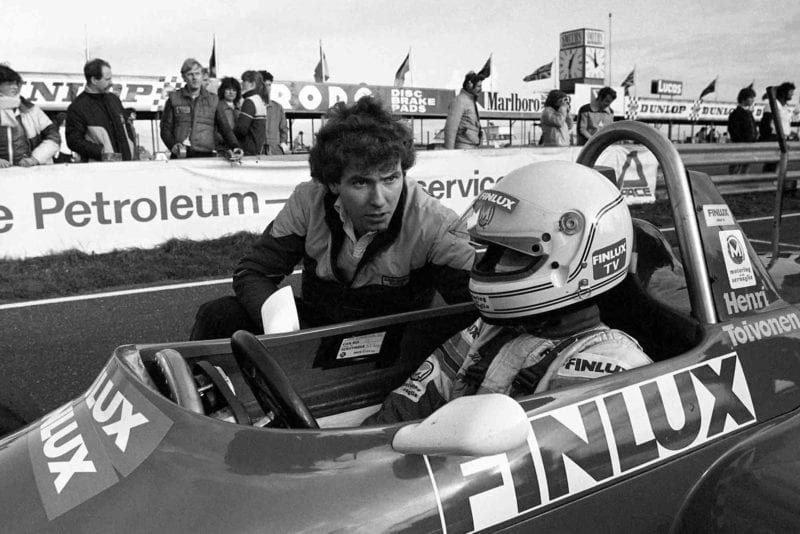
Toivonen tried his hand at circuit racing too, lining up on the grid here for Eddie Jordan Racing in F3 at Thruxton ’82
Motorsport Images
A lot has been said about him feeling unwell, but ill or not he was on stellar form to take the lead on the opening day. Out of all the stages held up to SS18 on day two where Toivonen crashed, Corte-Taverna, the Finn had won 12 of them. With three Lancias in the top five, the cars from Turin were heading for a dominant result.
The Delta S4 was not the easiest car to drive, with a vicious wall of power produced by the novel combination of supercharging and turbocharging a 1.8-litre engine until it officially put out 480 horsepower (the reality was almost certainly much higher). Get it right, though, and you had 0-60mph at your disposal in a fraction over two seconds: comparable to an F1 car.
Toivonen gave the car its debut victory on the 1985 RAC Rally and followed it up with another in Monte Carlo. As he hustled the unwieldy S4 through the opening kilometres of SS18, he knew he could win in Corsica…
The first seven kilometres of the Corte-Taverna stage are unremarkable. The road turns left out of the town and then climbs very slightly for the first kilometre or so, but most of it is level. It feels right to make this journey in a Delta, although the civilised thrum and leather trimmings of the latest turbodiesel model could not pose a greater contrast to the induction whoosh and throat-clearing roar that characterised the progress of its S4 predecessor. Only the bright white and blue shield of the Lancia badge in the centre of the steering wheel, moving rhythmically from left to right as it flows from hairpin bend to hairpin bend, provides any point in common to what Toivonen might have experienced on the final drive of his life. After a short straight, with a good line of sight, there is that left-hander, clearly visible. Then nothing.
“The thing I’ll never forget is the sheer anger I felt that we did not have the helicopter to be able to go and help them, as we’d had in the past,” says Ninni Russo, Lancia team manager at the time. “But that year, President Balestre at the FIA had decided that we weren’t allowed to fly over the cars to provide assistance, because he thought this would give the factory cars too much of an advantage over the privateers. As if a private car could have challenged for the top six anyway! I was furious: I wanted to find Balestre straight after the accident to shout at him about his stupid decision. Everyone sensibly stopped me from doing that; in the end it was [sporting director] Cesare Fiorio who went to meet him at the Campo dell’Oro hotel in Ajaccio that evening. From that conversation, the Group A concept was born which replaced Group B in 1987.”
It’s hard to know if the Lancia helicopter would have been able to help Toivonen and Cresto, but Russo’s raw frustration stems from the fact that he wasn’t even able to try.
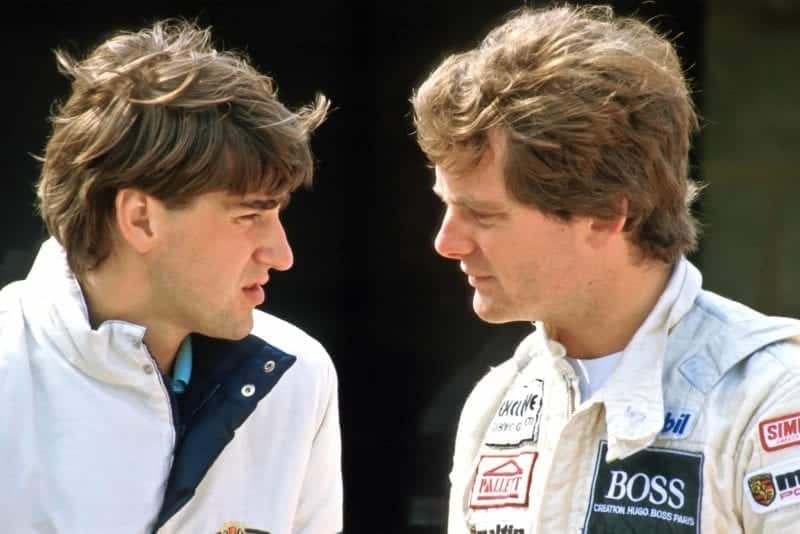
Toivonen in conversation with sports car racer Jonathan Palmer in 1984
Motorsport Images
Alén was the second person on the scene, having started the stage behind the Peugeot 205 T16 of Bruno Saby (which would go on to win the rally). An hour or so earlier, Alén had left the Lancia motorhome parked in Corte where he and Toivonen had both grabbed some sleep, a commodity that was generally lacking in world rallying throughout the ’80s.
“I said to Henri before we went out, ‘You’ve got three minutes in your pocket, there’s no need to push now,’” recounts Markku. “But Henri was always pushing. It’s just how he was. On that day, there was nothing different about him.”
As soon as Alén saw the black oil smoke, even before he got to the corner, he knew that there was little to be done. He stopped straight away, just as he had done the day before when his Peugeot rival Timo Salonen went off, luckily without consequence.
“As long as people keep remembering him, it means that Henri will never really die”
Alén’s co-driver Ilka Kivimäki tried to scramble down the valley to where the car had landed but was beaten back by the gradient and the heat. Alén – who would go on to become World Champion for just 11 days later that year, before the results from the Sanremo Rally were scrubbed – says he actually remembers very little about the immeasurable time that he was wandering helplessly by the side of the road: the human mind’s natural defence mechanism against traumatic events. “It was terrible, I recall just feeling that,” he remembers. “We had maybe 70 kilograms of fuel on board and magnesium wheels: there was no chance. All the cars were like bombs back then. We’ll never know what happened to Henri and Sergio and even if we did it doesn’t change anything. We all lost two friends as well as an amazing driver that day.”
Russo, too, was one of the last people to see Toivonen and Cresto alive. “I find it hard to put into words,” he says. “But most of all I remember them both being happy and serene at the start of the stage. And this is how I want to remember them, with that last image I have.”
It’s the image that the photo on the memorial until recently depicted: Henri smiling at the camera after one of his many successes, Sergio relaxed and at ease. The snapshot may be fading, but the memories endure. That corner on the D18 has become an established place of pilgrimage, but one person who has not been so far is Harri Toivonen.
“I have not felt ready yet, but I want to go and I will do,” says Harri. “As long as people keep remembering him, it means that Henri will never really die.”
